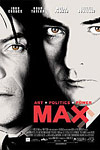Max (2002) (R) ★★
 The story of an artist's unlikely connection with Adolf Hitler in pre-World War II Germany.
The story of an artist's unlikely connection with Adolf Hitler in pre-World War II Germany.
Story
It's 1918 in Munich and Germany has just suffered the humiliating defeat of the Great War. Max Rothman (John Cusack), a once-promising artist, has returned from the war minus an arm and unable to paint. But he is a wealthy man, one of vision and generous spirit, and he opens what becomes a successful gallery in the hopes of furthering the talents of others and exploring emerging trends in art. His personal life in a cultured and assimilated Jewish family is less settled, as he juggles responsibilities as husband, father, and son and indulges in the pleasures of Liselore, his mistress. At one of his gallery openings, Max meets the young Adolph Hitler (Noah Taylor), also a war vet and painter. But Hitler as artist is frustrated and unrecognized; he's a bitter and destitute loner without friends, family or money. In other words, he's ready to blame his failures and misery on others, so why not the Jews? In spite of their differences, Hitler and Rothman grow friendlier, if not friendly. Rothman's artistic tastes veer toward the avant-garde and Hitler's toward traditionalism but they share common views about the recent war. Rothman is game, so he takes Hitler's work on consignment. But while appreciating Hitler's sketches, he ultimately rejects the work. Falling under the influence of an anti-Semitic army captain, Hitler learns he's skilled at oratory. Instinctively knowing how to play to a crowd and tapping into his own fury, he wins over an audience of anti-Semites with anti-Jewish rhetoric at a beer hall meeting. Having experienced both rejection and acceptance, Hitler pursues an obvious course.
Acting
John Cusack is terrific as the wealthy Jewish gallery owner who befriends struggling artist Adolph Hitler. Noah Taylor as Hitler, however, delivers an overwrought performance that veers upon caricature, striking some false notes. Not that Australian actor Taylor had an easy job of delivering the young Fuhrer but he plays the part too forced, too mannered, too theatrical. The role is thankless but surely some actor, perhaps in the hands of another director, might have delivered the goods. Other performances are fine, including Leelee Sobieski as Max's mistress and vet actress Janet Suzman as his mother.
Direction
Writer-director Menno Meyjes, who adapted The Color Purple for Steven Spielberg, makes his directorial debut here. While Meyjes coaxes more than serviceable performances from his actors, especially Cusack, other decisions no doubt made by the filmmaker are questionable. Production values are solid but some aesthetic choices fall short, especially the film's highly stylized sets that are more otherworldly than 1918 Munich. Meyjes gives us apocryphal sets, like the artists' vast loft that is more 21st than 20th century, that distance us from rather than immerse us in an interesting story suggested by history. Meyjes deserves much credit for daring to explore the psychology and circumstances that might have contributed to his pathology, evil and power over the masses.
Bottom Line
In a way, Max is an intriguing ''what if.'' What if the young aspiring artist Adolph Hitler had befriended a fellow artist who was compassionate, wealthy and Jewish, and who also might have tempered his monstrous views, curbed his manic will to power and saved the world from the Holocaust were it not for an understandable rejection of his work? The idea is intriguing and John Cusack as the eponymous Max is sensational. But too many other elements in the film ring false.
To get the full Quicklook Films experience, uncheck "Enable on this Site" from Adblock Plus
box office top 10

Civil War Released: April 12, 2024 Cast: Kirsten Dunst, Wagner Moura 11.1M

Abigail Released: April 19, 2024 Cast: Melissa Barrera, Dan Stevens 10.2M

Godzilla x Kong: The New Empire Released: March 29, 2024 Cast: Rebecca Hall, Brian Tyree Henry 9.5M

The Ministry of Ungentlemanly Warfare Released: April 19, 2024 Cast: Henry Cavill, Eiza Gonzalez 9M

Spy x Family Code: White Released: April 19, 2024 Cast: Takuya Eguchi, Saori Hayami 4.9M

Kung Fu Panda 4 Released: March 8, 2024 Cast: Jack Black, Viola Davis 4.6M

Ghostbusters: Frozen Empire Released: March 22, 2024 Cast: Paul Rudd, Carrie Coon 4.4M

Dune: Part Two Released: March 1, 2024 Cast: Timothée Chalamet, Rebecca Ferguson 2.9M

Monkey Man Released: April 5, 2024 Cast: Dev Patel, Sikandar Kher 2.2M

The First Omen Released: April 5, 2024 Cast: Nell Tiger Free, Bill Nighy 1.7M






